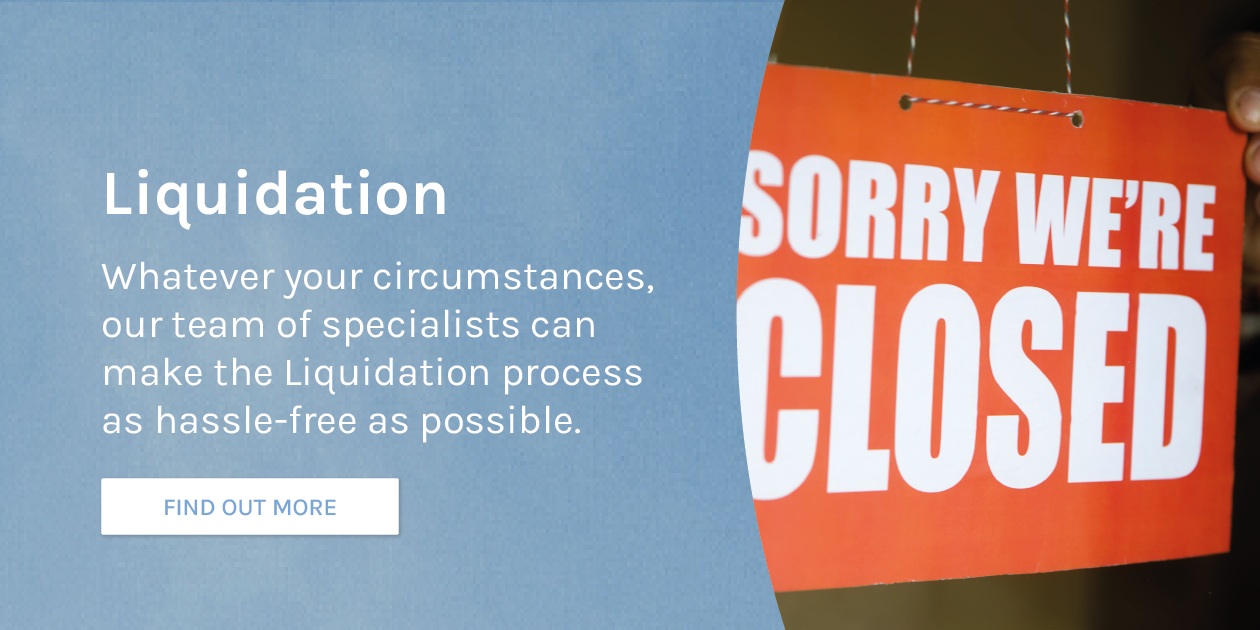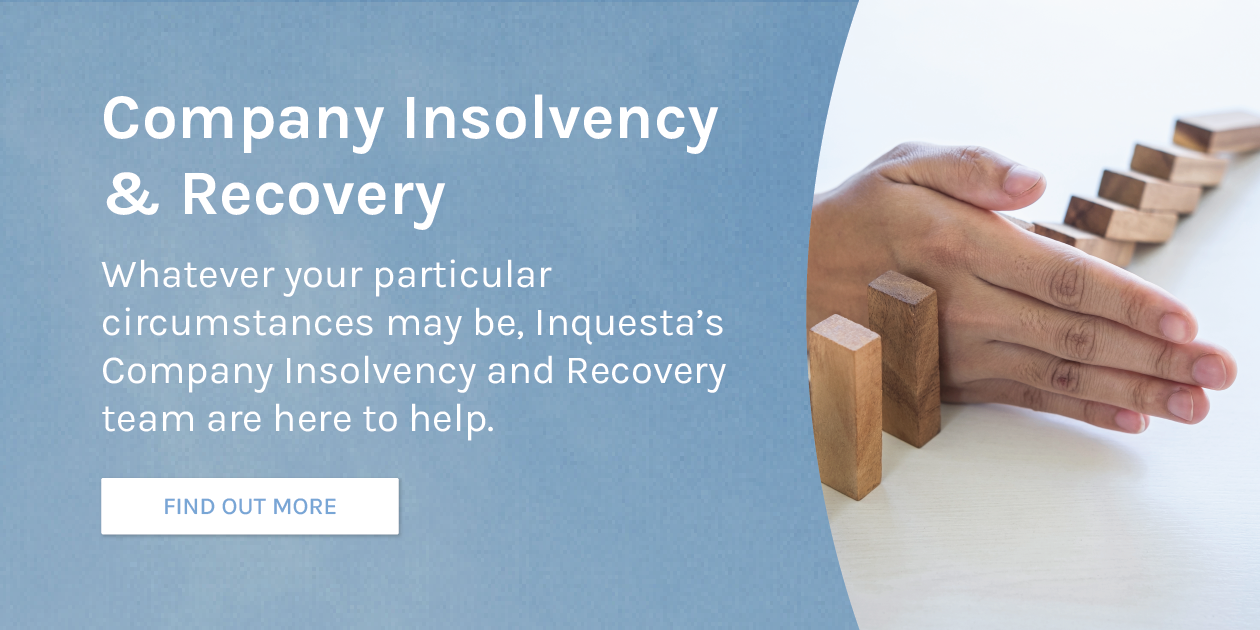Has your business been recently closed down, seemingly for good? If so, it’s not uncommon for directors to consider what to do next. When asking questions about the future, you might wonder ‘can you revive a dissolved company’ — can you wind back the clock and pick up where you left off?
Well, while it is possible to revive a dissolved company, there are a handful of restrictions and requirements in place that could make the process somewhat difficult.
Find out more on if you can revive a dissolved company, how it can be achieved, the protocol behind using the name of a dissolved business, and more in the latest blog from the Inquesta Insolvency team.
What Does it Mean When a Company is Dissolved in the UK?
Dissolving a business in the UK involves the formal process of closing it down. This is done by ‘striking the company off’ the register at Companies House. Dissolving a business can be done either voluntary or involuntary — and is generally seen as the most straightforward method of closing a business down.
Solvent liquidation refers to when a company makes the conscious decision to wind down. This is often a result of the director(s) wishing to retire, move on to another venture, or no longer seeing the merit in keeping the business going. Conversely, insolvent liquidation will only occur if your business is no longer able to continue due to outside pressures, often due to financial commitments/debts. In an insolvent liquidation, the business is struck off and all assets are sold in an attempt to repay creditors.
Can I Reopen a Dissolved Company?
You can reopen a dissolved company. If your business was dissolved through non-compliance, you have the option to reopen it using a method known as administrative restoration. However, if your business was struck off by voluntary dissolution, it may only be restored by court order.
Administrative restoration can only take effect if all of the following are applicable to your case:
- The company in question was solvent when it was wound up
- The striking off was within the last six years
- You acted as director/shareholder of the business
If any one of the above conditions did not apply to you, you will likely need to instead apply to the courts.
How to Reinstate a Dissolved Company?
The process of how to reinstate a dissolved company will depend on the circumstances behind the closure. If the business was dissolved through non-compliance, you are able to reinstate it via administrative restoration. However, if it was shuttered voluntarily, you can only apply for restoration via a court order.
The process of reinstating your dissolved company by the methods outlined above will include:
Administrative Restoration
You are only able to apply to restore your dissolved company within six years of the date of dissolution.
The actual process to restore your company is often both expensive and time-consuming. It also involves a huge number of moving parts, forms, and steps that must all be completed properly and quickly. This includes sending the following to Companies House:
- A completed administrative restoration application form (Form RT01)
- A £100 cheque payable to Companies House
- Outstanding documents and fees required to bring filing records up to date
- Confirmation statements
- Overdue accounts
- A Bona Vacantia waiver letter
- Penalty payments
If your application is accepted, you can expect your business to be restored as soon as you receive the confirmation letter from your registrar. If it is refused, it may be possible to apply for a court order to have the business restored, or get a discretionary grant. Either way, it is recommended that you contact a specialist at this stage to assess your options going forward.
If the registrar does opt to restore the business, it is important that you remember that your business is fully and immediately restored. This means that, effectively, its previous closure did not officially happen. Your business is seen to have carried on as if it had never been dissolved or struck off the Register.
Once the process of restoring your business is complete, you may also be able to apply for a discretionary grant. This is designed to help shareholders reclaim their money.
Restoration by the Courts
It is possible, should the situation require it, that you can restore a dissolved company that you were never even a part of. If you were either a company creditor, or you had an unfulfilled written contract with them and were owed money when it was dissolved, you may be able to apply to the courts. A court order is a method you can use to restore a company with the explicit purpose of extracting financial assets that you feel you are owed.
Court mandated restoration, unlike the administrative restoration process, is not seen to be quite as time-sensitive or cost-intensive. This is because there is no need to file accounts or annual returns, and there are no penalties for overdue accounts, etc.
The process of court restoration only requires that you create a witness statement for the court and pay a £280 administration fee. Once the application is received, the court will issue the claim — which must be served to the Registrar of Companies, and a Treasury Solicitor before a Bona Vacantia waiver letter is, once again, required.
Should the courts deem your application to be acceptable, they will make an order to be served to the Registrar of Companies. Once received, the business will be officially restored.
Court restoration is only a temporary process. It is used mostly to restore the business for a short period of time whereby creditors are able to recover assets or pursue claims.
Can You Use The Name of a Dissolved Company?
You are able to use the name of any dissolved business and apply it to your new company. However, restrictions are in place to prevent directors of recently liquidated companies registering new businesses under their old firm’s name. This is to stop these directors from continuing where they left off — thereby cheating the phoenix company system.
Restrictions in place include not being able to use a ‘prohibited name’. This refers to any name a liquidated business was known as at any point immediately preceding it closing down (within 12 months), or anything deemed too similar to the registered names. These restrictions are enforced against the director directly.
If this is not applicable to you, there are no official restrictions in place with regards to utilising the name of a dissolved company. However, you should consider the reputation of the old business prior to its liquidation.
If the company trading under your desired name was acting fraudulently, providing a shoddy service/product, was dodging creditors, etc. then it is entirely possible that your business could end up being mistaken for the previous bearers of the name by old creditors, or even affected customers.
Alternatively, if the dissolved firm had a glowing reputation in the local area, your new business could potentially benefit from the association. It might, therefore, be utilised as a method of attracting a customer-base, as all you would need to do to attract repeat business is match the old company’s service.
Before utilising the name of a dissolved company for your business, it is recommended that you take the following measures:
- Research the dissolved business to see if any issues arise
- Check review sites such as TrustAdvisor, Yelp, TripAdvisor, etc. to assess customer goodwill prior to dissolution
- Access the dissolved business’s final accounts via Companies House
- Carry out a credit check on the dissolved business
How Inquesta’s Team Can Support You in Liquidation
If you’re a business owner of a dissolved company and are considering what steps to take next, it is recommended that you contact a licensed insolvency practitioner at the earliest opportunity.
Thanks to decades spent honing our skills in the industry, our team is perfectly placed to provide an all-encompassing, high-quality insolvency service. We understand the difficulty and stress that comes with the liquidation of your company — this is why we always offer the most balanced support possible, while always considering your best interests.
We have a history of assisting businesses and directors of all walks of life. Regardless of your past, your speciality, or your net worth, we are on hand to help you.
Whatever your current circumstances, our liquidation service is designed to support you through a difficult and emotionally charged time in your life. Our support can include the following:
Get in touch with a member of our team today for more information on the services we have listed above, or for additional details about what we can do for you. Alternatively, request a completely free no-obligations consultation.




